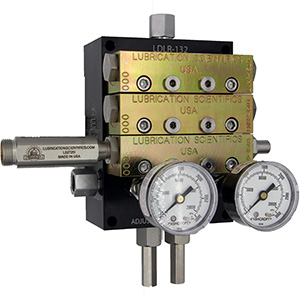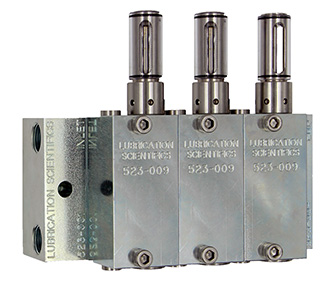The increasingly unmanageable costs of bearing failures are a burden to manufacturing and industrial of all sizes. Frequently these costs are a consequence of the failure to verify that bearings are receiving the proper amounts and types of lube oil or grease via the integration of monitoring capabilities into large, automated lubrication systems.

Lubrication Scientifics designed the MDL-50 dual-line lubrication system for continuous lubrication and monitoring of critical equipment bearing points over long distances.
Lubrication Scientifics designed the MDL-50 dual-line lubrication system for continuous lubrication and monitoring of critical equipment bearing points over long distances.
Without proper lubrication, bearings seldom survive more than 5-10% of their potential service life. This is due to multiple factors, among which corrosion, heat, caustic elements and high shock loads are major players.
However, according to Richard Hanley, president of Lubrication Scientifics, failure to properly lubricate production equipment, particularly at the critical points, can be an even greater cause of bearing failures and resulting in unnecessary downtime and replacement costs.
Lubrication Scientifics engineers and manufactures a variety of automated lubrication systems and components that are installed on equipment used in a wide variety of manufacturing applications.
The critical points Hanley refers to include those bearing points that, if not provided the appropriate lubricant at necessary intervals, will cause the most extensive damage to equipment or present risks to plant personnel.
“You can’t be sure that you are lubricating all of those points successfully unless you have consistently accurate monitoring, or verification, that the lubricant is dispensed through the pump to the point where it should be injected – at proper intervals,” Hanley explained.
Yet, the large investments required to install and maintain lubrication systems with monitoring capabilities – often $500,000 or more - discourages manufacturing operations from adopting automated lubrication systems. Or, if they are installed, they often require frequent and expensive repair or replacement.
The conventional approach — The traditional methodology for heavy industrial lubricating applications is the conventional dual-line lubrication system. Capable of delivering varied amounts of lubricant, this type of automated system is ideal for lubricating thousands of points over long distances, with lube oil or grease output being controlled individually at each point. Also important, a single blockage will not shut down the entire system.
Yet, there are drawbacks to this standard dual-line system. Because it is comprised of multiple one-piece lubrication dispensing blocks (each servicing up to eight points), whenever a single lube point fails, the entire block most be replaced, resulting in added time and labor to the cost of a replacement block. But even more significant to many applications, critical point monitoring, or verification, is very expensive with standard dual line systems.
“In heavy industrial application such as steel mills and metal working plants, the cost of critical point monitoring has become a key issue,” Hanley said. “In large systems, it can cost thousands of dollars to monitor a single bearing point.”
A modular alternative — To reduce those monitoring investments dramatically, and simultaneously to reduce bearing maintenance and replacement costs, Lubrication Scientifics has introduced a new design in dual-line lubrication systems, one that can continuously lubricate and monitor critical equipment bearing points over long distances. The new system, known as the MDL-50 Series, is a modular design with lower investment costs and higher system sustainability.

The MDL-50 Series is a modular design, with lower investment costs and higher system sustainability for manufacturing operations with critical lubrication requirements.
Because of its modular design, the MDL-50 retains the benefits of standard dual-line systems, and the MDL series offers several additional features that dramatically reduce lifetime maintenance costs. For example, it is never necessary to disconnect MDL supply or discharge valves to change out a non-working section. When valve replacement is required, only the piston section – rather than the entire valve block – is replaced, a job that takes only about two minutes instead of two hours.
In order to meet the largest lubrication system requirements, the MDL-50 system design also permits the creation of dual-line valves with an infinite number of outlets, making this technology ideal for the automated lubrication of equipment.
“Essentially, the user can tap into the dual lines anywhere and insert a dual-line valve, a capability that enables and the grouping of critical lubrication points into zones,” The Lubrication Scientifics president explained. “Creating zones enables system designers to economize on monitoring hardware. In effect, this provides systems design options that have never before been available.”
The new, modular system is available in both carbon steel and 316 stainless steel for use in highly caustic environments, including those that are washed down with caustic solutions.
Also, the MDL-50 series provides the flexibility of a “hybrid” system because it can be easily converted to dispense either grease or oil without having to abandon the original investment in dual-line components.
Long-term benefits, short-term payback — Hanley noted that conventional dual-line systems with monitoring capabilities cost users in excess of $100 per point to incorporate monitoring hardware, plus installation expenses. “Using the new modular dual-line approach with critical points grouped in zones, users can monitor everything tied to that valve, up to 360 points, for less than $1,000,” he said.
He added that, with modular dual-line systems dispensing grease, significant reduction of lubricant usage is required – sometimes a reduction of 90%. “This not only saves on grease costs but also virtually eliminates the high costs of grease disposal.”
Hanley added that while the savings of lube oil will not be as great as that of grease, by ensuring that a constant supply of clean oil in the required amount and intervals also will greatly improve bearing life, which is the most important payoff of the modular system.

 Industry News
Industry News
